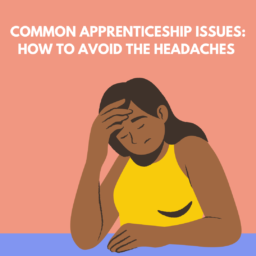“How much do I have to pay my marketing apprentice, Mitch?”. This is an incredibly common question that I’m asked when I’m discussing marketing apprenticeships with prospective employers.
As hiring managers and business owners, you’ll be working within your recruitment budget and it’s going to likely be one of the first things you think about when talking to an apprenticeship provider. So, in this short article, I wanted to discuss how we approach the pay question and our recommendations on how much you should be paying your marketing apprentice.
It’s all about the variables
It’s like the old saying goes “How long is a piece of string?”. When it comes to paying your employees there are loads of variables you’d likely consider. Things like:
- Location;
- Experience;
- The role & responsibilities, etc.
And, apprentices are no different. However, there are a couple of nuances to consider when formulating your salary expectations.
National minimum wage
As you’ll be aware, there is a national minimum wage in place in the UK. As of April 2024, the figures are rising so we’ve popped them down below for you:
- 21 years of age and over: £11.44ph;
- 18 to 20 years old: £8.60ph;
- Under 18 years old: £6.40ph.
There is also a specific figure dedicated to apprentices which is the same as the under 18 years old category at £6.40 an hour.
Now, most apprenticeships require a minimum of 30-hour contracts. But, for the purpose of some quick maths, we’ll assume you’re looking to hire someone on a 37.5-hour contract. We’ve calculated the annual salaries for those minimum wage amounts:
- 21 years of age and over: £22,308;
- 18 to 20 years old: £16,770;
- Under 18 years old: £12,480;
- Apprentice: £12,480.
So, you’re probably thinking “Well, there you go then, that’s how much I’ll pay.” But, it’s important to consider a couple of other factors first.
Considerations around apprenticeship salaries
As previously mentioned, there will likely be a couple of considerations that you need to think about before pulling the trigger on an apprentice. These include:
- How much can you afford to pay them?;
- Are you looking for a school or college leaver, a graduate, or someone looking to retrain?;
- Where are you based?;
- Will they need to drive or travel to an office regularly?;
- What is the role and duties? etc.
Thinking about these sorts of things will put a lot of this into context. For example, it’s highly unlikely, even bordering on the impossible, that you’d attract a graduate if you’re offering £12,480 a year for a role where they’ll need to work a 37.5-hour week and also travel into an office each day.
A rough idea of their starting salary
We have a quick rule of thumb when it comes to rough salary expectations and that’s the “give-or-take 10%” rule. Simply take the minimum wage and subtract 10%. So, it could look like this:
- 21 years of age and over: £20,500;
- 18 to 20 years old: £15,100;
- Under 18 years old: £12,480;
- Apprentice: £12,480.
As you can see, this doesn’t apply to the under 18 and apprenticeship minimum wage though. To reduce those figures, you’d need to reduce the hours within the contract itself. However, we’d argue if you need to do that, you should be looking at alternatives to apprenticeships instead.
The idea here is that you’re still offering someone a valid salary that may be below the minimum wage but is compensated with a foot in the door to a meaningful career and additional support and training.
Being more generous can have it’s benefits
Now, there are several benefits of offering more than these figures and it’s something that we often discuss with our employers. By offering more money to your apprentices, you will:
- Attract a higher calibre of candidate to your role;
- Increase apprentice retention;
- Demonstrate that you’re looking to invest in the future of your organisation;
- Eliminate the chances that your apprentice leaves for other opportunities;
- and, it makes your apprentice’s life a little easier financially.
Super important note
This only applies to organisations that pay their apprentices below the national minimum wage categories. But, the apprenticeship minimum wage rules state that you can only pay someone an apprenticeship salary for 12 months before you have to increase it to the national minimum wage for their age group.
Effectively, this means that if you hired a graduate and were paying them £20,500pa during the apprenticeship. As soon as they’ve worked for you for one year, you’d have to then increase their salary to accommodate the national minimum wage requirements. In this example, you’d need to increase their salary to £22,308pa using a 37.5-hour contract as a reference.
With a lot of apprenticeships, this will only really affect you when your learner is on a level 4 or above programme. However, most level 3 apprenticeships incorporate an EPA period of around 3 months. This means that for those 3 months, you’d need to pay your apprentice the national minimum wage.
How much is too much?
Well, that’s not really a thing. Ultimately, you’ll pay what you’re able to or want to. Again, this all depends on your specific requirements. However, it would be worth thinking about things like:
- The seniority of the role;
- The level of apprenticeship programme;
- The duties and responsibilities;
- Any required prior experience or education, etc.
For example, it’s not uncommon to see those studying towards level six apprenticeships earning in the region of £30,000 – £40,000. Whereas those studying level three apprenticeships may earn £15,000 – £22,000. But again, this is all dependent on a long list of variables.
What would we recommend you pay your marketing apprentices?
Because we specialise in marketing apprenticeships and currently offer two programmes, it’s a little easier for us to provide rough guides on salary expectations for candidates and roles. Here’s our rough guide based on location, course, and education. We’ll start with those living and working outside of London.
Outside London by age, education, and course
Education / Background |
Multi-Channel Marketer |
Market Research Executive |
|---|---|---|
| School leaver | £12,500 – £14,000 | £13,000 – £14,000 |
| College leaver | £15,000 – £18,000 | £15,000 – £18,000 |
| Graduate | £20,000+ | £20,000+ |
| Retrainer (someone generally over the age of 22) | This depends on a number of variables but should be more in alignment with industry averages for entry level roles. | Similar to Multi-Channel Marketer |
Living in or around London by age, education, and course
Education / Background |
Multi-Channel Marketer |
Market Research Executive |
|---|---|---|
| School leaver | £13,500 – £15,000 | £13,000 – £14,000 |
| College leaver | £16,000 – £18,000 | £15,000 – £18,000 |
| Graduate | £21,500 – £24,000+ | £21,500 – £24,000+ |
| Retrainer (someone generally over the age of 22) | This depends on a number of variables but should be more in alignment with industry averages for entry level roles. | Similar to Multi-Channel Marketer |
So there you have it
There’s our rough guide to marketing apprenticeship salaries. Now, it’s just our rules of thumb and you may ultimately choose to pay more or less than what we recommended. However, it’s important to consider that if you can pay more and show that you’re ultimately looking to invest in your apprentice, it’ll help your training provider to attract better candidates, improve the chances that they’ll stay with your organisation, and work harder while they’re there.
Interested in seeing more of our guides, advice, and articles on marketing apprenticeships?
Then sign up for our monthly newsletter. We’ll send you all the information on our latest stuff and general updates as well. Sign up below!

















